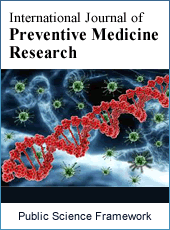International Journal of Preventive Medicine Research
Articles Information
International Journal of Preventive Medicine Research, Vol.1, No.3, Aug. 2015, Pub. Date: Jul. 11, 2015
Polio Eradication in Nigeria: Prospects and Challenges-A Review
Pages: 167-172 Views: 4812 Downloads: 3052
[01]
Muhammad A. B., Department of Medical Laboratory Science, Faculty of Allied Health Sciences, Bayero University, Kano, Nigeria.
[02]
Yahaya H., Department of Medical Laboratory Science, Faculty of Allied Health Sciences, Bayero University, Kano, Nigeria.
[03]
Ibrahim A., Department of Medical Laboratory Science, Faculty of Allied Health Sciences, Bayero University, Kano, Nigeria.
[04]
Tijjani M. B., Department of Microbiology, Faculty of Science, Ahmadu Bello University Zaria, Kaduna, Nigeria.
[05]
Ahmad M. B. M. B., Department of Medical Laboratory Science, Faculty of Allied Health Sciences, Bayero University, Kano, Nigeria.
The global polio eradication initiative (GPEI)—an international partnership of government and private institutions—has reduced the burden of polio worldwide by more than 99 percent. However, the last 1% of the journey has experienced several setbacks and rate of progress has slowed down in the last few years. Nigeria is one of the remaining three (3) endemic countries in the world that has never interrupted the transmission of the poliovirus compared to more than 125 countries in 1988. In the past few years, Nigeria made some giant strides in polio eradication efforts. There are some obstacles to be surmounted. Controversies based on unfounded rumours about alleged adverse health effects, vaccine safety, contamination with anti-fertility drugs and virus that causes HIV/AIDS; overdose as well as promotion of anti Oral polio vaccine (OPV) sentiments by political and religious opinion leaders led to a noticeable decline in vaccine acceptance. The security challenge in the northern part of the country has put the polio eradication at risk. The federal, state governments and other stakeholders should regard the eradication of polio as a national public health emergency. Misinformation and controversy surrounding this campaign should be squarely addressed through robust public enlightenment campaign, targeting marginalized communities with information on the importance of vaccination and to respond directly to their expressed concerns. What are the prospects and challenges to polio eradication in Nigeria? This paper reviews these and other relevant issues regarding polio eradication in Nigeria.
Polio, Eradication, Nigeria, OPV and GPEI
[01]
Akande A.A. and Akande T.M., (2006). Polio Eradication in Nigeria: Controversies and Way Forward. African Journal of Clinical and Experimental Microbiology, 7(3): 175-179.
[02]
Alto, V (2008). ‘Perspectives on polio immunization campaigns in Ibadan, Nigeria’. Michigan Ann Arbor, MI: M Publishing
[03]
Centre for Disease Control and Prevention (CDC), (2006). Resurgence of wild poliovirus type 1 transmission and consequences of importation--21 countries, 2002--2005. MMWR; 55:145--50
[04]
Centres for Disease Control and Prevention (CDC), (2007). Progress toward poliomyelitis eradication---Nigeria, 2005--2006. MMWR; 56:278--82
[05]
Centres for Disease Control and Prevention (CDC), (2007). Update on vaccine-derived polioviruses---worldwide, January 2006--August 2007. MMWR; 56:996--1001.
[06]
Centres for Disease Control and Prevention (CDC), (2008). Progress toward interruption of wild poliovirus transmission--worldwide, January 2007--April 2008. MMWR; 57:489--94.
[07]
Centres for Disease Control and Prevention (CDC), (2009). Morb. Mortal. Wkly Rep. 58:357-362.
[08]
Centres for Disease Control and Prevention (CDC), (July, 2010). What Would Happen If We Stopped Vaccination? http://www.cdc.gov/vaccines/ vac-gen/whatifstop.htm
[09]
Centres for Disease Control and Prevention (CDC). (2005). polio eradication is feasible in Nigeria. Progress eradication--Nigeria, January 2004--July 2005. MMWR; 54: 87-7
[10]
Cheng W. (2004). Reaching the Unreached: Communication Support for the Pakistan Polio Eradication Initiative. New Delhi: United Nations Children’s Fund Regional Office for South Asia.
[11]
Discussions in Anthropology. Vol. 17, No.1, Department of Anthropology, University of Michigan
[12]
Global Polio Eradication Initiative (GPEI), (2011). Polio Eradication This Week. http://www.polioeradication.or
[13]
National Primary Health Care Development Agency and Federal Ministry of Health, (2008). Progress toward Poliomyelitis Eradication --Nigeria, January 2007--August 12, 2008.
[14]
Nwozor, C.M. (2013). Facing the challenges of polio Eradication in Nigeria. Journal of Medical and Applied Biosciences. 5(1): 100-106.
[15]
Obregon R., Chitnis K., Morry C., Feek W., Bates J., Galeway M.,and Ogden E. (2009). Achieving Polio Eradication: A Review of Health Communication Evidence and Lessons Learned in India and Pakistan. Bulletin of the World Health Organization: 87:624-630
[16]
Renne, P.E (2010). The Politics of Polio in Northern Nigeria. Indiana University Press
[17]
Renne, P.E (2012). ‘Polio in Nigeria’: History Compass. Vol.10, No.7, 496-511
[18]
Tagbo, B.N. (2012). Achieving polio eradication in Nigeria: prospects and challenges, Niger J Paed., 40(1):15-23
[19]
United Nations Children’s Fund Regional Office for South Asia (2004). Building Trust in Immunization; Partnering with Religious Leaders and Groups (Working Paper), New Delhi.
[20]
Willey J.M., Sherwood L.M., Woolverton C.J., (2008). Prescot, Harley and Klein’s Microbiology. 6th Edition. International Edition. McGraw-Hill Higher Education. New York. 940-1.
[21]
World Health Assembly (WHA) (2008). Resolution WHA 61.1 Poliomyelitis: mechanism for management of potential risks to Eradication. May 2008.
[22]
World Health Organization (WHO) (2009). Global Polio Eradication Initiative Strategic Plan 2009-2013 Framework Document. Geneva.
[23]
World Health Organization (WHO) (2008). Poliomyelitis in Nigeria and West/Central Africa, Wkly Epidemiol Rec; 83:233—6.

ISSN Print: 2381-7038
ISSN Online: 2381-7046
Current Issue:
Vol. 5, Issue 2, June Submit a Manuscript Join Editorial Board Join Reviewer Team
ISSN Online: 2381-7046
Current Issue:
Vol. 5, Issue 2, June Submit a Manuscript Join Editorial Board Join Reviewer Team
| About This Journal |
| All Issues |
| Open Access |
| Indexing |
| Payment Information |
| Author Guidelines |
| Review Process |
| Publication Ethics |
| Editorial Board |
| Peer Reviewers |


